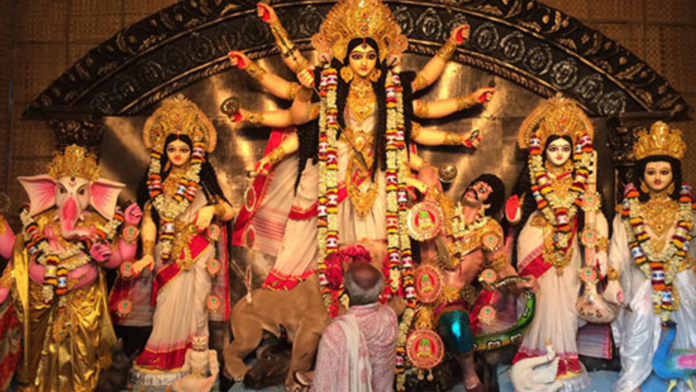The Tripura government has recently announced stringent guidelines regarding the use of loudspeakers and sound systems during Durga Puja celebrations. This comes as part of an initiative to ensure that the festivities remain enjoyable while adhering to safety and noise control measures. The guidelines aim to address issues surrounding noise pollution and provide a safe environment for all residents, as well as the many devotees and visitors who participate in the celebrations across the state.
The new directives require all puja organizers to obtain prior permission from the district administration for the use of loudspeakers and other sound equipment. These permissions include stipulations on volume limits and set time frames for when loudspeakers can be used. Officials have emphasized that these guidelines are meant to prevent disruption to neighborhoods, particularly during the late hours, and to avoid conflicts over noise disturbances. District authorities will monitor compliance, and those found violating the noise restrictions will face strict action from the police.
Durga Puja in Tripura, as in many parts of India, is celebrated with immense enthusiasm. Thousands of devotees participate in the festival, which is marked by the installation of idols, traditional rituals, and cultural programs. However, the growing concern over noise pollution has prompted the government to take a more active role in managing the festivities. Loudspeakers, often used for playing devotional songs and announcements, can easily exceed safe noise levels, especially when used continuously or during late-night hours. This has led to complaints from residents, especially those living near large pandals, who have raised concerns about the impact on their daily lives.
According to the guidelines, puja committees must ensure that sound levels do not exceed the prescribed limits, particularly in residential areas. The Tripura State Pollution Control Board has set specific decibel limits that should be adhered to during the festival, with day-time limits typically higher than those allowed at night. Sound levels in residential areas must not exceed 55 decibels during the day and 45 decibels at night. In commercial areas, the daytime limit is slightly higher at 65 decibels. The government’s decision to impose these limits aims to balance the festive spirit with the needs of residents who may not be participating in the celebrations.
Tripura’s Chief Secretary Kumar Alok has stressed the importance of these guidelines, stating that noise pollution affects not only human health but also the environment. He explained that excessive noise can lead to health issues such as increased stress levels, hearing impairment, and sleep disturbances. Alok has urged puja committees to follow the rules and warned that non-compliance will result in penalties, including possible revocation of permits for future events. Local police stations will deploy officers to monitor puja pandals and ensure the rules are followed. Authorities have also encouraged residents to report any violations they witness, and a helpline has been set up for this purpose.
The Tripura government has also outlined guidelines for maintaining safety and security during Durga Puja celebrations. Apart from noise control measures, the government has emphasized fire safety and crowd management. Puja organizers are required to install fire extinguishers and ensure that fire exits are unobstructed. Given the large crowds that gather for the event, organizers must also put in place measures to manage foot traffic and avoid overcrowding. Medical teams will be on standby in crowded areas to provide assistance if necessary, and security personnel will be deployed at key locations.
These guidelines have elicited a mixed response from residents and puja organizers. Some members of puja committees have expressed concerns that the restrictions could dampen the celebratory atmosphere. However, others have recognized the need for such measures, particularly in densely populated urban areas where sound amplification can easily affect a large number of people. Many residents have welcomed the guidelines, viewing them as a necessary step toward responsible celebration practices.
The implementation of these noise control guidelines reflects a growing trend in India to balance tradition with modern standards of environmental and public health. Other states, such as West Bengal and Maharashtra, have also introduced similar measures to regulate noise levels during major festivals. As Durga Puja is a festival of deep cultural significance, the challenge lies in preserving its vibrancy while ensuring that celebrations remain respectful of everyone’s right to a peaceful environment.
The Tripura government’s proactive approach underscores a commitment to maintaining public order during one of the region’s most celebrated festivals. By working together with puja organizers and the community, they hope to create a more harmonious and sustainable festival experience that everyone can enjoy. This year’s Durga Puja promises to be a blend of traditional celebration and modern responsibility, setting a positive example for future festivities.




